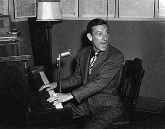These words were spoken by black pianist Reginald DuValle in 1916 to a young Hoosier with a passion for music. Following that advice to his death in 1981, Hoagy Carmichael fashioned a string of enduring songs and instrumentals that led to his rise as one of America's foremost songwriters.
Today, Carmichael's work has been collected in The Classic Hoagy Carmichael, copublished by the IHS and the Smithsonian Institution's Collections of Recordings. The set presents 57 recordings of the best songs of the legendary Indiana-born singer and songwriter featuring such great names in modern American music as Louis Armstrong, Benny Goodman, Artie Shaw, Glenn Miller, Billie Holiday, Frank Sinatra, Bing Crosby, Ella Fitzgerald, Ray Charles, and Carmichael himself. The collection, which was nominated for two Grammys, also includes a booklet detailing Carmichael's life, an evaluation of his music and informative commentary on each of the selections.
Researched, compiled, and produced by John Hasse of the Smithsonian Institution, the collection was the product of research spanning eight years. With Carmichael's best songs, Hasse found it difficult to select a single recording. Consequently, there are two versions each of "Georgia on My Mind," "Lazy River," "The Nearness of You," "Rockin' Chair," and "Skylark." In the case of Carmichael's best-known piece, "Stardust," Hasse included six different recordings. The versions are dispersed throughout the recording. For example, the first part of the collection includes a 1931 recording of the song by Louis Armstrong and the set concludes with a performance, 53 years later, by another leading trumpeter, Wynton Marsalis.
Born in Bloomington, Indiana, on Nov. 22, 1899, Hoagland Howard Carmichael was the first son of Howard Clyde and Lida Mary (Robison) Carmichael. The young Carmichael's earliest musical influence was his mother, who supplemented the family's meager income by playing piano for dances at Indiana University and for silent movies.
Spending his youth mostly in Bloomington and Indianapolis, Carmichael grew up with the new century and the new ragtime music. At that time, Indiana and Indianapolis were important centers for ragtime composing and publishing. He formed a jazz band while attending Indiana University and it was there that Carmichael befriended the first great white jazzman, cornetist Leon "Bix" Beiderbecke.
By his own account, in 1927 Carmichael had journeyed to West Palm Beach, Florida, to work as a law clerk. While there, he happened to hear a recording of his song, "Washboard Blues, " by cornetist Red Nichols's band. It was then that he decided to abandon law and make his way in the music world. It was the right choice; in 1971 he was elected to the Songwriters Hall of Fame as one of its 10 initial inductees. After suffering a heart attack, Carmichael died in Rancho Mirage, California, on Dec. 27, 1981. He was returned to his native Bloomington for burial on Jan. 4, 1982.
Search | Feedback | Staff Directory | Home
©Copyright 2000 Indiana Historical Society

